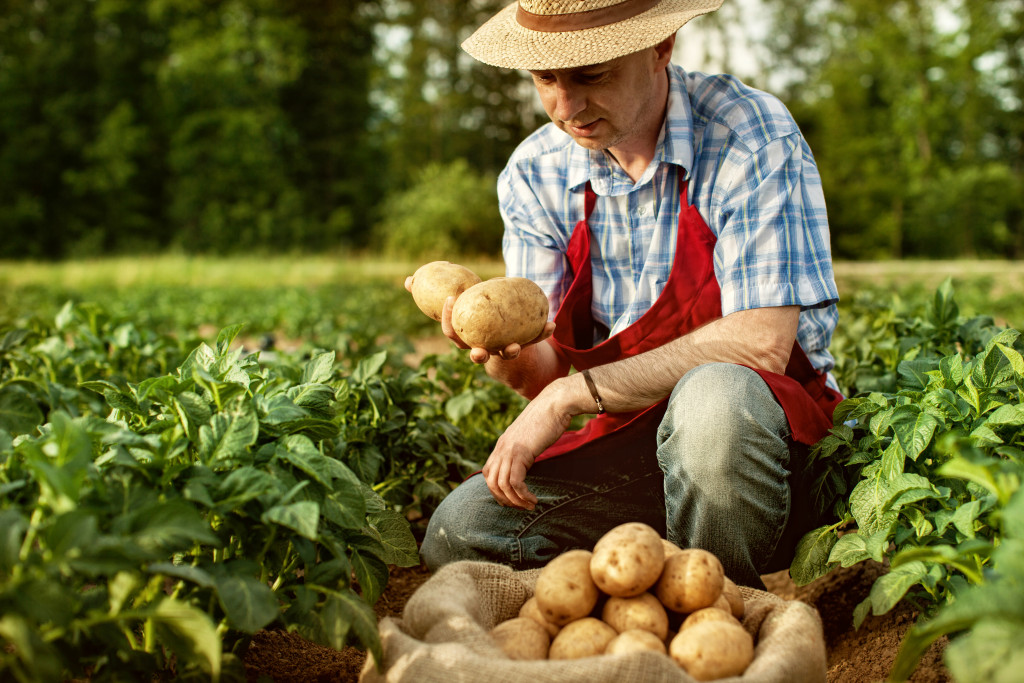- Becoming familiar with farming rules and regulations is essential before launching into operations.
- The right equipment and supplies are crucial for a successful farm business.
- Marketing the farm’s goods and services is essential to reach potential customers.
- Farming offers numerous benefits, such as increasing food security, providing employment opportunities in rural areas, preserving biodiversity, and reducing soil erosion.
Starting a farm can be very profitable and rewarding, monetarily and personally. According to the Census of Agriculture, the total value of U.S. farm production was estimated to be $267 billion. It is estimated that approximately 97% of all American farms are family-owned or operated, making farming an excellent option for families looking to make an investment in their future and generate income from their land.
In addition to providing a steady source of income, starting a farm also offers numerous other benefits, such as increasing local food security by providing locally sourced food options to communities and creating employment opportunities in rural areas. Farming also helps to preserve biodiversity by preserving habitats for local wildlife species and reducing soil erosion through crop rotation practices.
Starting a farm can be profitable, but only if you go into it with the proper knowledge and preparation. Here are a few tips to keep in mind when starting your farm:
Understanding the Rules and Regulations
Starting a farm is not as easy as it may seem. Before launching into operations, becoming familiar with the rules and regulations governing farming is essential. These regulations vary from state to state, so research the laws applicable to your area before beginning any activities on your farm. Understanding the necessary permits, licenses, and other requirements you must fulfill can help you avoid costly fines and other legal issues in the future.
Learning about safety protocols and environmental protection measures should also be essential to your research. Many states have specific guidelines for how animals should be cared for, what type of labor practices are allowed, and the chemicals that can be applied to crops. Staying informed about these laws can help ensure your business complies with all regulations, protecting yourself and your customers from potential harm.
Understanding zoning laws in your area is essential before starting a farm. Ensure you are aware of local building restrictions and land use rules; failure to do so could result in expensive fees or even tearing down structures if they are found to be violating the law. Additionally, researching what kind of taxes will apply to your property can help you plan accordingly when it comes time to file taxes each year.
Getting the Equipment and Supplies

The right equipment and supplies for farming cannot be overlooked. Having the right tools and materials is essential for any successful farm business. The following subheadings will explain why having the right equipment and supplies is so important, with examples of each:
Tractors and Machinery
Tractors and other machinery are an essential part of any farm business. These machines make cultivating land, harvesting crops, transporting goods and more possible. On larger farms, a tractor can pull plows, spreaders, wagons, or trailers might be essentials. Smaller farms may require hand-held tools such as shovels or rakes to get the job done. Moreover, farm equipment repair services might be necessary to ensure those pieces of machinery can serve you longer.
Livestock Care Supplies
For those with livestock on their farm, properly caring for animals is essential to running a successful business. This includes providing adequate food and water for all animals on the property and protecting them from disease or injury through vaccinations and regular health checkups. Additionally, having the proper materials for housing animals is also essential. These may include feed troughs, bunkers, and shelters from extreme weather conditions such as sheds or barns.
Fertilizers and Pesticides
Fertilizers and pesticides play an essential role in keeping crops healthy by providing nutrients in the soil that plants need to grow correctly and reducing pest infestations that could damage crops. Different fertilizers may be required depending on the type of crops you are farming (e.g., vegetables versus grains). Organic options are available if you wish to avoid synthetic chemicals but apply them slower than chemical fertilizers due to their natural properties and composition. Similarly, with pesticides – organic options exist as well as conventional ones – but care must be taken when applying either type to prevent harm to your plants and pollinators such as bees, which are vital for crop production.
Irrigation Systems and Water Tanks
Irrigation systems help ensure adequate water supply for crops during dry periods when rain typically does not fall often enough in specific areas; these systems can vary depending on the size/type of operation being conducted (e.g., drip irrigation versus sprinkler systems). In addition to having an irrigation system installed on your land (or leased from another farmer if necessary), ensuring you have adequate water storage tanks (e.g., cisterns) available can help conserve water when it is scarce or expensive.
Marketing Business

To profit from farming, you must effectively market your products and services. This includes not only announcing goods for sale but also forming relationships with buyers (such as local chefs and food retailers) and informing them about the quality of your goods. Building a website or social media platform can help you reach potential customers more efficiently. At the same time, developing partnerships with other farm owners in the area can increase the visibility of your business.
You can also market products through traditional advertising, such as print and radio ads, direct mail campaigns, or TV commercials. Additionally, consider signing up for local farmer’s markets or local events where you can put your goods on display and meet potential customers in person.
Final Thoughts
These are just a few tips to help you get started on the path to running a successful farm business. With proper planning and research, investing in land can be an excellent way to generate income while preserving natural resources and contributing to the local community. So go out there and get farming!




